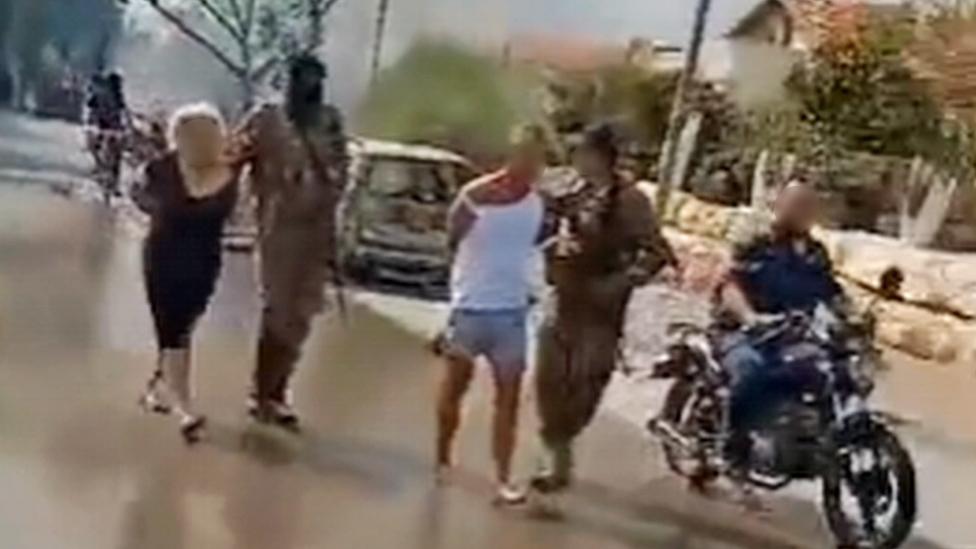'A lot of adrenaline, a lot of unknowns': Reservists flock to join Israel's fight
- Published
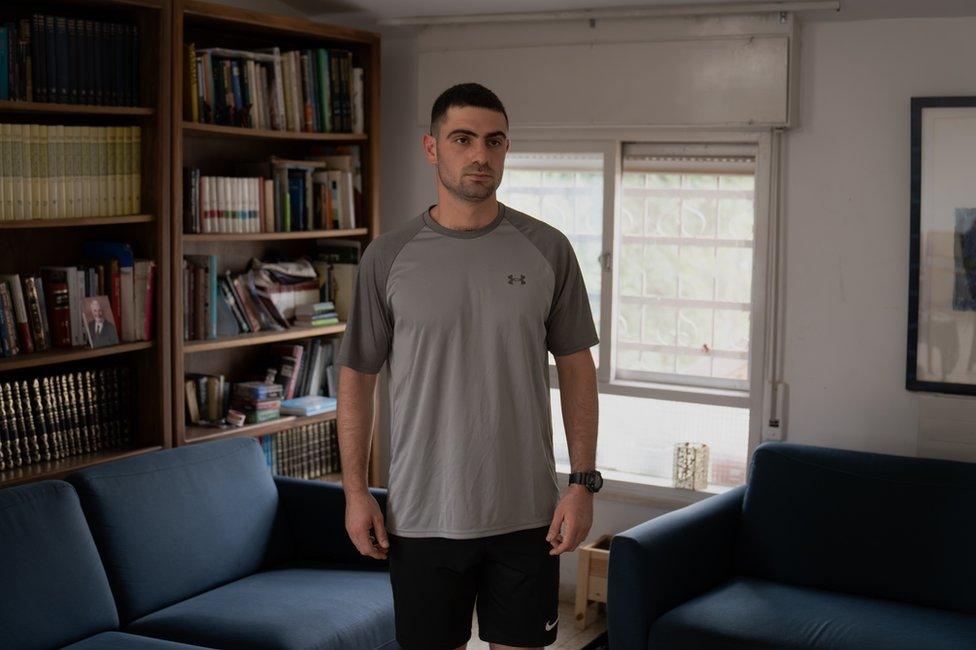
Army reservist Michael Goldberg at home in Jerusalem
As Israel rushed onto a war footing on Saturday morning, young army reservists around the country were already moving faster than the military machine.
"From 6.30am, we were itching to know why we weren't being called up already," said Michael Goldberg, a 24-year-old reservist in Jerusalem.
Mr Goldberg had woken up early to a flood of videos of Hamas's devastating attack. He had only recently returned to Jerusalem, to visit family after moving to the US six months earlier. Watching the attack unfold, he knew instantly that he would not be returning to the US.
Instead, Mr Goldberg began to pack underwear and socks, and make whatever other preparations he could to serve his country.
"I guess in most places, you wait for the call," he said. "In Israel you start to get ready before it comes."
Israel is still reeling from Saturday's surprise attack by Hamas militants, who killed at least 1,000 people and wounded many more. In the few days since, the nation of more than nine million has called up a record 360,000 reservists to help respond.
Israel's army relies on an enormous reserve contingent, made up of civilians who have completed their compulsory national service but can be mobilised again for duty until the age of 40.
On Saturday afternoon, Mr Goldberg finally got the call he was waiting for. But he wasn't mobilised immediately. Sitting in his family home early on Monday morning, he was impatient to go.
"There is a tremendous amount of fear," he said. "But you are also inspired in ways you have never been before. I realised that this is the defining moment of my life."
Mr Goldberg's eagerness has been mirrored across the nation and beyond. So many reservists have felt compelled to return to duty that Israel's El Al airline announced it would run extra flights to bring home those abroad.
Some who have already joined up have complained that there is not enough kit to go around. And at some muster points in Jerusalem at the weekend, volunteers were turned back because their units were already over capacity, or still catching up.
"I drove one of my sons to the base today and they said we are not organised enough yet, come back in two days," said Alan Sacks, a Jerusalem lawyer and father of six.
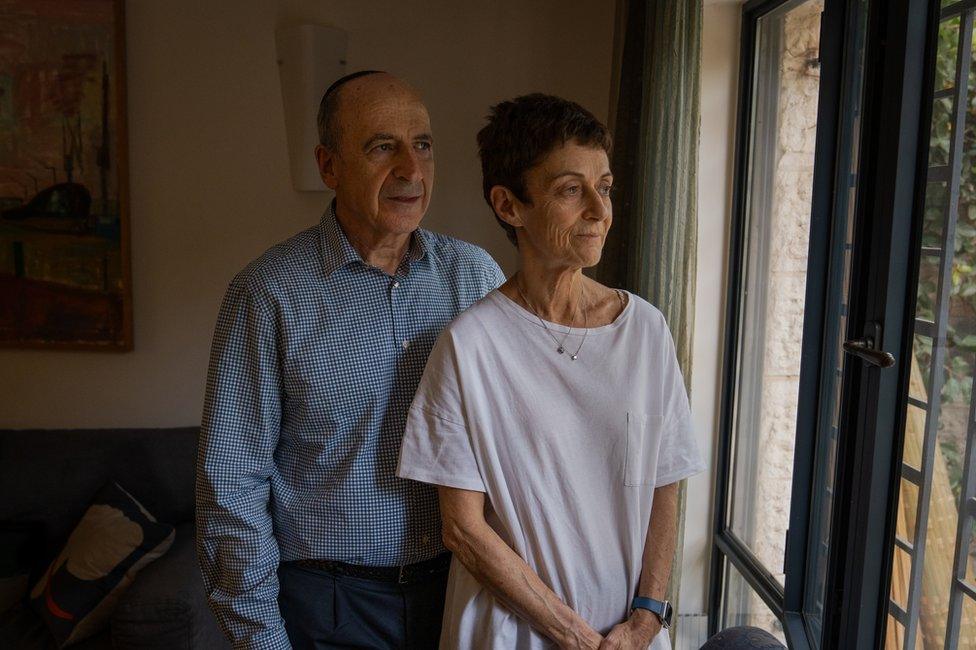
Three of Alan and Judith Sacks' sons were mobilised, while one was waiting to sign up
Of Mr Sacks' five sons, three had already been mobilised over the weekend. One was still trying to find a place. His youngest, aged 25, was "very much in the hotspot at the moment," Mr Sacks said - working with a special forces unit near Gaza.
"Two weeks ago, Israel was torn apart, left against right," he said, referring to recent large-scale protests over controversial judicial reforms. "And now you have all these reservists lining up together to go. It's an extraordinary transformation."
Mr Sacks was receiving updates via WhatsApp on Monday from his mobilised sons. He smiled with pride when his phone buzzed with a selfie from the 25-year-old, who had been able to communicate the least.
The nation's civilian military was "fundamental to the existence of Israel," he said. "This is not an anonymous army, everyone has a child or a cousin or a father who is involved."
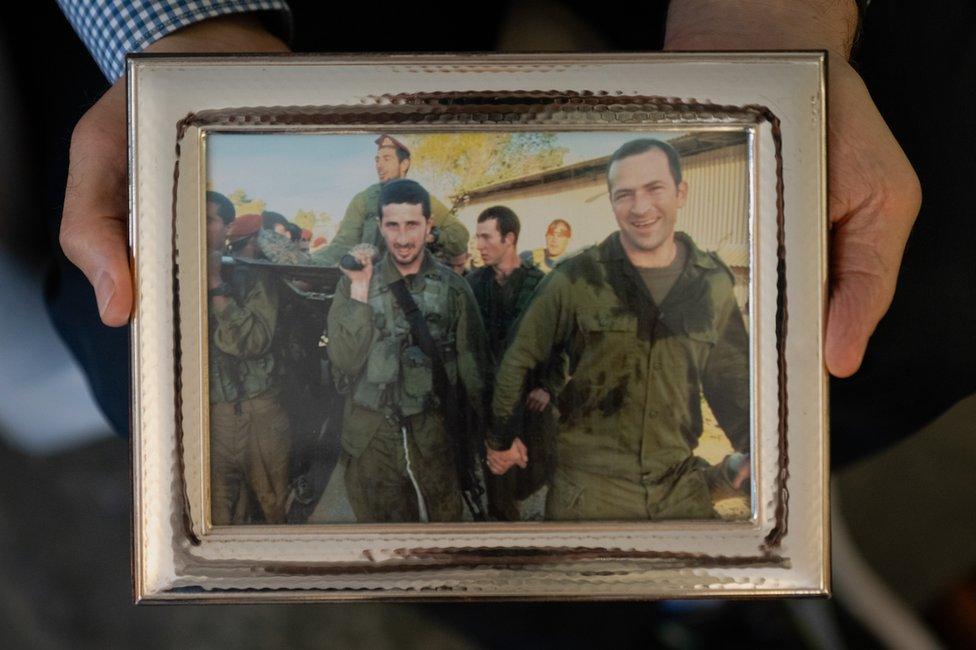
Two of Alan and Judith Sacks' sons in uniform - both were mobilised after the Hamas attack
Calls have now gone out to reservists from their early twenties all the way up to those aged 40 - the cut-off age at which you become exempt from duty.
Shay, 40, a taxi driver in Jerusalem, who did not want to give his full name, was on holiday in Greece when he got the call. It had been 20 years since his national service, he said, but he had done refresher training over the years to avoid becoming rusty with a gun.
"Even if I was exempt I would still go," he said. "I want to go for me, and for my country, but I have two young children and I am scared."
Elkana Bar Etan, a 38-year-old reservist, didn't wait for the call. "I just texted my commander to say I'm here, and he texted right away and said come," Mr Bar Etan said.
He was immediately deployed to the border with Lebanon, from where he spoke to the BBC. As he spoke, mortar strikes could be heard in the background.
"I never in my worst nightmares imagined that this would be the circumstances for being called up again," he said.
"I'm here on the border, in full uniform, and I'm thinking about my children. But my decision was simple, really, you feel the obligation."
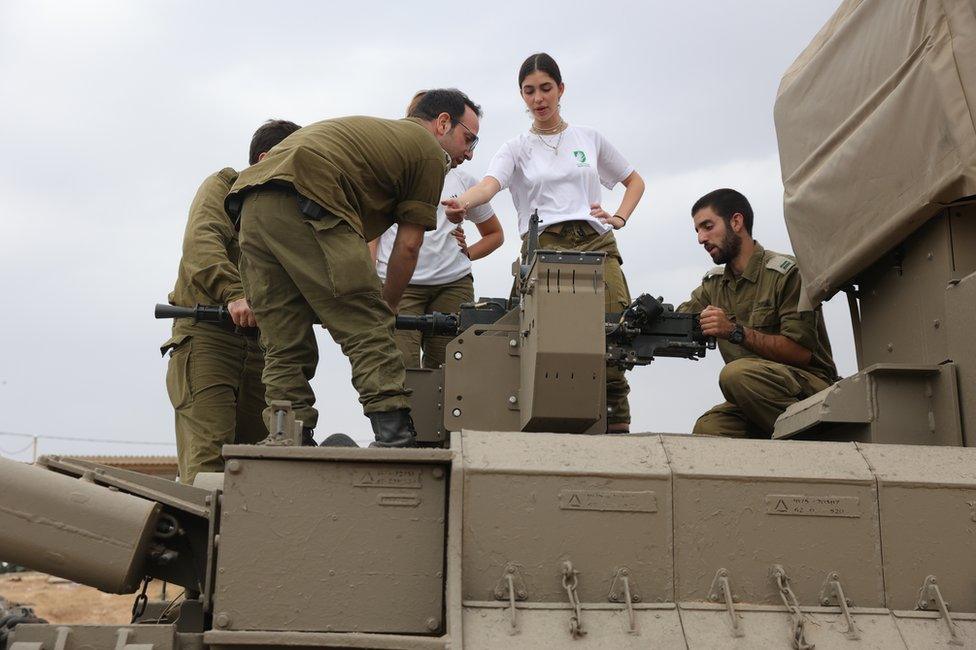
Army reservists stand near Beer Sheva, Israel on Sunday
Even the cut off age did not stop the volunteers. At Jerusalem's main bus station on Monday, Nissim Baranes, 45, was sitting in uniform waiting for a public bus south that, so far, didn't seem to be coming.
"I think the public transport is also operating on emergency terms," he said.
Mr Baranes was doubly exempt from duty, because not only was he over 40 but he also had six children - the number that excuses a parent from being called up.
And yet there he was, alone at the bus station, with a modest rucksack, trying to get himself closer to somewhere he could be useful.
"It is a good feeling to put on the uniform again," he said. "These are hard days for Israel."
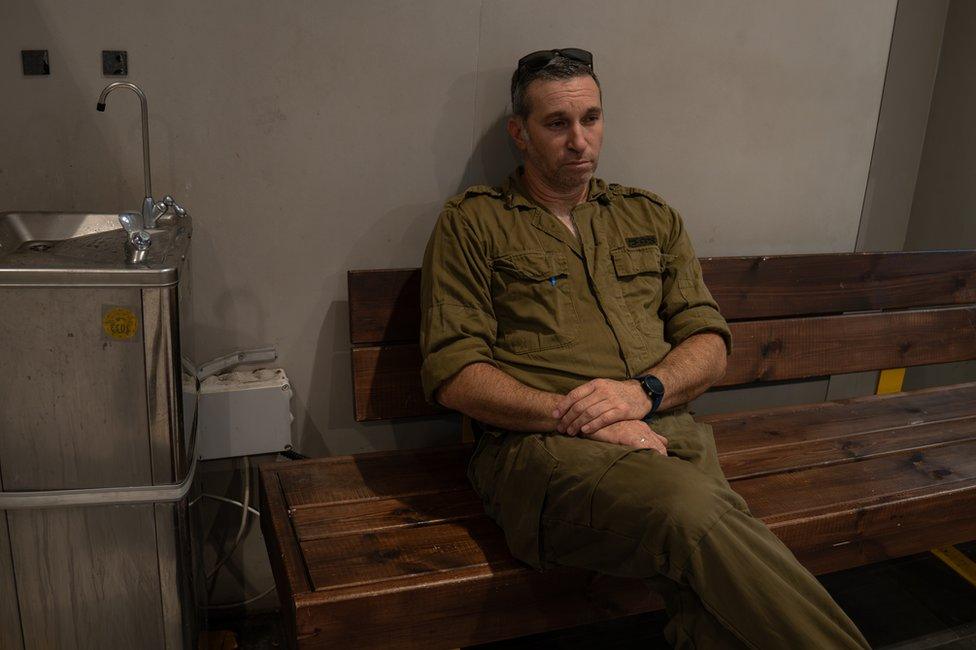
Nissim Baranes, 45, waited alone for bus south, despite being exempt from reserve duty
For some parents, this is not the first time they have watched their sons and daughters go to take part in this conflict.
One of Mr Sacks' sons served in the 2014 Gaza war. During that time, he and his wife Judith would sit on the front balcony of their house, dreading the appearance of a uniformed soldier walking up the driveway, Judith said.
That feeling was now rushing back, she said, with tears in her eyes. "Then there was one child serving, now there are two serving and two more waiting to go in."
The reservists already in position and those still waiting to go said they had no idea how long this new mobilisation would last. Israel has launched waves of retaliatory air strikes against the Gaza Strip which have killed at least 900 people. Many are expecting a ground invasion that could bring weeks of suffering.
"There is a mixed feeling of wanting it to end now and wanting to change the Middle East," said Michael Goldberg, the 24-year-old reservist who was waiting impatiently to leave.
"There is a lot of mixed emotion, a lot of adrenaline, and a lot of unknowns," he said.
Idan Ben Ari contributed to this report. Photographs by Joel Gunter.

More on Hamas-Israel attacks

- Published9 October 2023
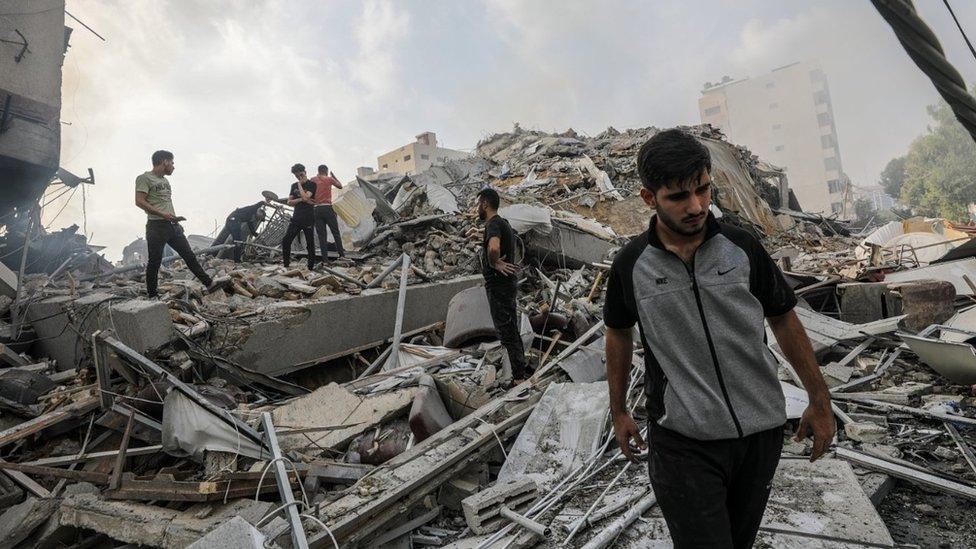
- Published7 October 2023
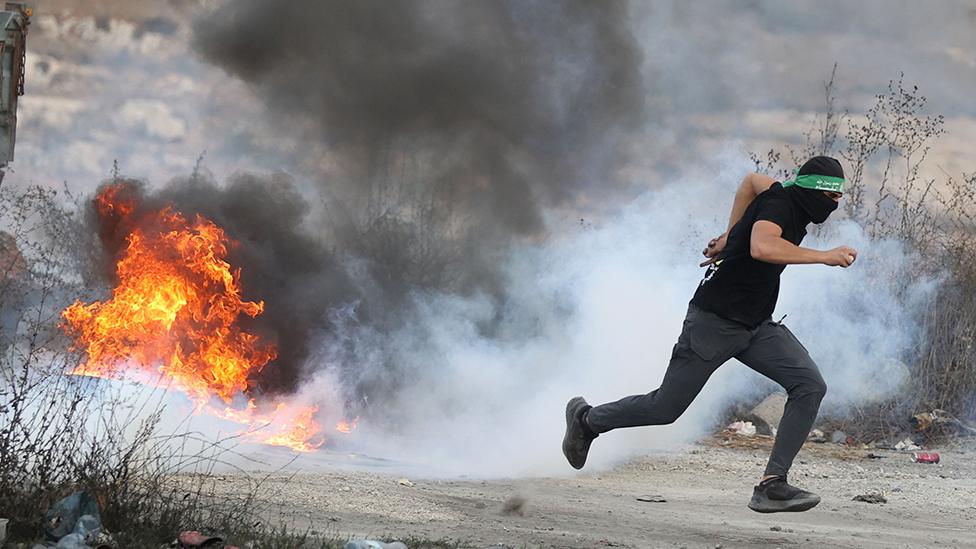
- Published8 October 2023
